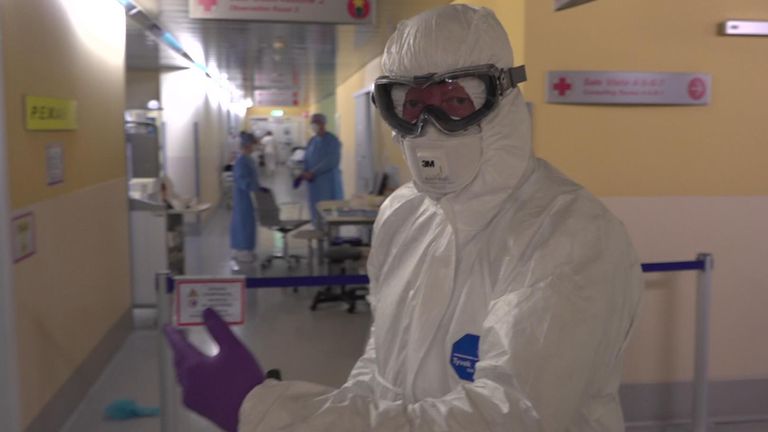Coronavirus: Champions League match a 'biological bomb' that infected Bergamo, experts say
Atalanta's home game with Valencia was held two days before the first case of locally transmitted COVID-19 was confirmed in Italy.
Thursday 26 March 2020 13:14, UK
A football match played last month was a "biological bomb" that may have helped cause Bergamo in northern Italy to become an epicentre of the coronavirus pandemic, experts have said.
Atalanta's home Champions League tie against Valencia, held two days before the first case of locally transmitted COVID-19 was confirmed in the country, has been dubbed "Game Zero" by local media.
More than 44,000 fans, including around a third of the population of the province of Bergamo in the Lombardy region, attended the last-16 first leg at the San Siro stadium in Milan on 19 February.
It was billed as the biggest game in Atalanta's history.
Nearly 2,500 fans of the Spanish club also made the trip.
More will have gathered in homes, bars and clubs to watch the match, which Atalanta won 4-1, sparking jubilant scenes inside and outside the ground, on television.
Less than a week after the game, the first cases were reported in the province of Bergamo.
The contagion was reported in Valencia at about the same time after a journalist who travelled to the match became the second person infected in the region.
More than a third of Valencia's squad became infected after the match in Milan, while on Tuesday, Atalanta announced its first positive case in goalkeeper Marco Sportiello.
:: Listen to the Daily podcast on Apple Podcasts, Google Podcasts, Spotify, Spreaker
More than a month later, experts say the game may be one of the biggest reasons why Bergamo has become one of the epicentres of the coronavirus pandemic.
Fabiano di Marco, the chief pneumologist at the Pope John XXIII hospital in Bergamo, told Corriere della Sera the fans travelled to the match "in buses, cars, trains. A biological bomb, unfortunately."
Luca Lorini, the head of the intensive care unit at the hospital, has around 100 patients under his care with the coronavirus and there are many more in other parts of the hospital.
He said: "I'm sure that 40,000 people hugging and kissing each other while standing a centimetre apart - four times, because Atalanta scored four goals - was definitely a huge accelerator for contagion.
"Right now we're at war. When peace time comes, I can assure you we will go and see how many of the 40,000 people who went to the game became infected. Right now we have other priorities."
Bergamo Mayor Giorgio Gori said this week: "It's very probable that 40,000 Bergamaschi in the stands of San Siro, all together, exchanged the virus between them.
"Unfortunately, we couldn't have known. No one knew the virus was already here. It was inevitable."
More than 7,500 people have died after contracting coronavirus in Italy, where there are more than 74,000 cases, according to Johns Hopkins University.
More than 650 people have died in the last 24 hours in Spain, taking the total past 4,000.
Cases there rose by more than 8000, bringing the total to more than 50,000.






